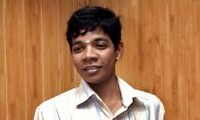 Sai Prasad Vishwanathan took the phrase ‘nothing is impossible’ too literally! He fought against all odds — despite being thrown out of school once because of his physical disability — to get a research scholarship for an MS degree at the University of Wisconsin (USA), a gold medal for academic excellence, and job offers from three top MNCs, later culminating in an admission to the Indian School of Business (ISB). He also holds the record of being India’s first disabled person to skydive from 14,000 feet.
Sai Prasad Vishwanathan took the phrase ‘nothing is impossible’ too literally! He fought against all odds — despite being thrown out of school once because of his physical disability — to get a research scholarship for an MS degree at the University of Wisconsin (USA), a gold medal for academic excellence, and job offers from three top MNCs, later culminating in an admission to the Indian School of Business (ISB). He also holds the record of being India’s first disabled person to skydive from 14,000 feet.
Anyone, says Vishwanathan, can achieve success when a society recognises a person’s abilities rather than disabilities, when peers are sensitive to an individual’s dreams instead of being merely sympathetic, when educational institutions provide the much-needed confidence and when physically disabled people themselves believe that something extraordinary is possible, regardless of the odds. It’s probably this belief that won him the Twelfth NCPEDP (National Centre for Promotion of Employment for Disabled People)-Shell Hellen Keller Award (in recognition of the inspiring and motivating journeys of the differently-abled and of organisations and others supporting their cause).
Vishwanathan’s is not a standalone success story; one doesn’t need to look that far to appreciate the extraordinary feats of various differently-abled people — Hellen Keller, Stephen Hawking, Albert Einstein and Thomas Alva Edison, continue to inspire. A good education, awareness and courage stand out as common elements as one maps their stories. Today, while awareness has been built around disability issues, educational facilities for differently-abled people have also improved.
 This year, 684 differently-abled students passed the Central Board of Secondary Education (CBSE) Class 12 exams. The all-India figure also saw a marginal rise from 1,112 students last year to 1,366 this year. Delhi University has also registered an increase in applications this year. Close to 507 differently-abled students applied to the university this year as compared to 499 last year. The number of such students applying for higher education has been on a gradual rise over the past many years, the reasons for which, academicians say, are many.
This year, 684 differently-abled students passed the Central Board of Secondary Education (CBSE) Class 12 exams. The all-India figure also saw a marginal rise from 1,112 students last year to 1,366 this year. Delhi University has also registered an increase in applications this year. Close to 507 differently-abled students applied to the university this year as compared to 499 last year. The number of such students applying for higher education has been on a gradual rise over the past many years, the reasons for which, academicians say, are many.
With the student community, and society in general, getting more aware and sensitised to the needs of special students, things are looking up for such pupils and their parents. According to Ujjaini Ray, media coordinator, Lady Shri Ram College for Women: “A lot of differently-abled students opt for LSR and we have a fairly large number of such students. The campus is very safe and we try accommodating some students in the hostel. The campus is disabled-friendly. It has built-in ramps and a separate washroom for such students. The college is also working towards installing a lift so that these students have access to all the areas on campus.
“Apart from facilities inside the campus, the college works out a support system where other students and teachers all come together to assist any differently-abled student, if required. We have sessions where students read out to visually impaired students. Reach, which is a student body, works at recording common texts so that these students can make use of this material. Books in Braille are available and we try to assist the students in the best way possible,” adds Ray.